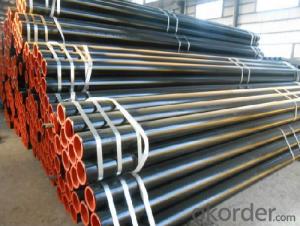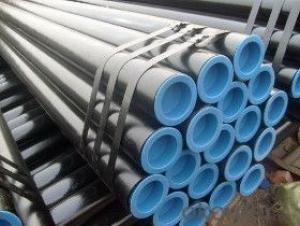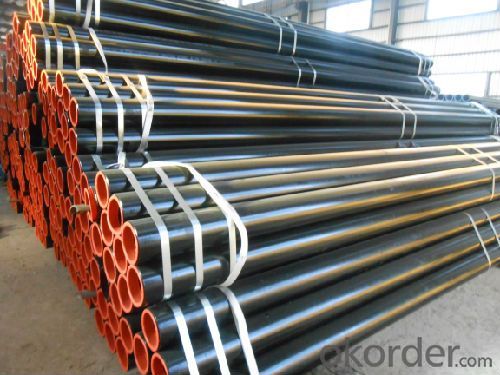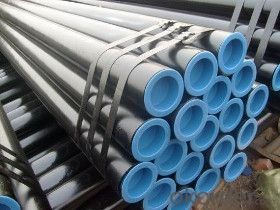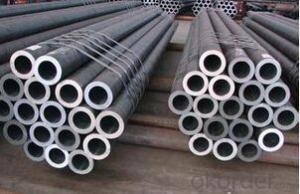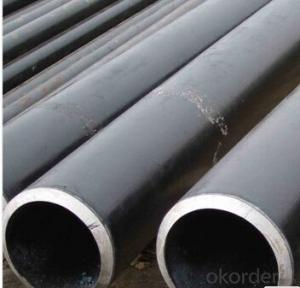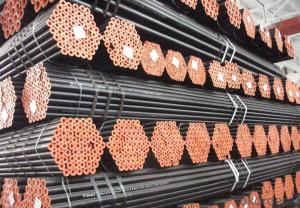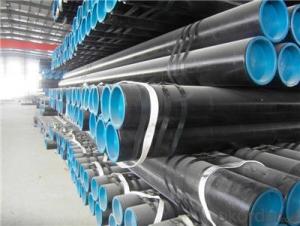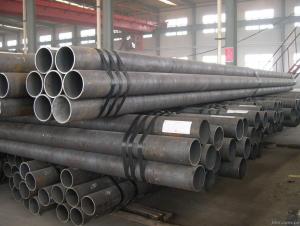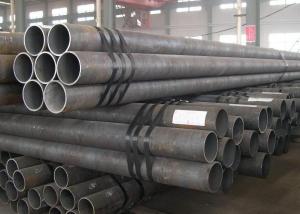Seamless Steel Tubes for Low and Medium Pressure Boiler
- Loading Port:
- Tianjin
- Payment Terms:
- TT OR LC
- Min Order Qty:
- 30 m.t.
- Supply Capability:
- 12000 m.t./month
OKorder Service Pledge
OKorder Financial Service
You Might Also Like
1、Structure of Seamless PipeGB3087:
Seamless pipe is formed by drawing a solid billet over a piercing rod to create the hollow shell. As the manufacturing process does not include any welding, seamless pipes are perceived to be stronger and more reliable. Historically seamless pipe was regarded as withstanding pressure better than other types, and was often more easily available than welded pipe.
Standard: GB3087: Seamless Steel Tubes for Low and Medium Pressure Boiler
2、Main Features of the Seamless Pipe GB3087
• High manufacturing accuracy
• High strength
• Small inertia resistance
• Strong heat dissipation ability
• Good visual effect
• Reasonable price
3、Seamless PipeGB3087:Specification:
Standard | GB, DIN, ASTM ASTM A106-2006, ASTM A53-2007 |
Grade | 10#-45#, 16Mn 10#, 20#, 45#, 16Mn |
Thickness | 8 - 33 mm |
Section Shape | Round |
Outer Diameter | 133 - 219 mm |
Place of Origin | Shandong, China (Mainland) |
Secondary Or Not | Non-secondary |
Application | Hydraulic Pipe |
Technique | Cold Drawn |
Certification | API |
Surface Treatment | factory state or painted black |
Special Pipe | API Pipe |
Alloy Or Not | Non-alloy |
Length | 5-12M |
Outer Diameter | 21.3-610mm |
Grade | 20#, 45#, Q345, API J55, API K55, API L80, API N80, API P110, A53B |
Standard | ASME, ASTM |
4、Packaging & Delivery
Packaging Details: | seaworthy package,bundles wrapped with strong steel strip |
Delivery Detail: | 15-30days after received 30%TT |
5、FAQ of Seamless Pipe GB3087:
①How is the quality of your products?
Our products are manufactured strictly according to national and internaional standard, and we take a test
on every pipe before delivered out. If you want see our quality certifications and all kinds of testing report, please just ask us for it.
Guaranteed: If products’ quality don’t accord to discription as we give or the promise before you place order, we promise 100% refund.
②How about price?
Yes, we are factory and be able to give you lowest price below market one, and we have a policy that “ for saving time and absolutely honest business attitude, we quote as lowest as possible for any customer, and discount can be given according to quantity”,if you like bargain and factory price is not low enough as you think, just don’t waste your time.Please trust the quotation we would give you, it is professional one.
③Why should you chose us?
Chose happens because of quality, then price, We can give you both.Additionally, we can also offer professional products inquiry, products knowledge train(for agents), smooth goods delivery, exellent customer solution proposals.Our service formula: good quality+good price+good service=customer’s trust
SGS test is available, customer inspection before shipping is welcome, third party inspection is no problem.
6、Seamless Pipe GB3087 Images:
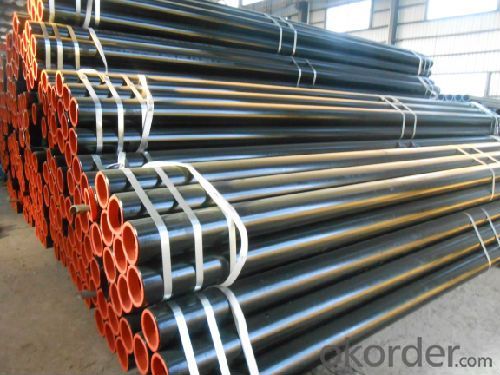
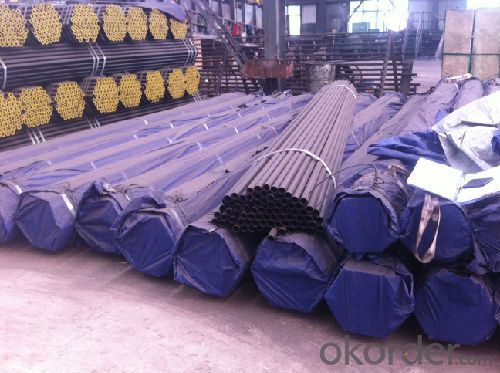
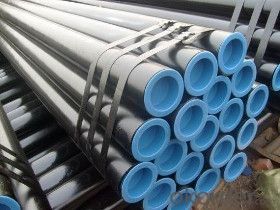
- Q: Can steel pipes be used for sewer systems?
- Yes, steel pipes can be used for sewer systems. However, they are less commonly used compared to other materials such as PVC or concrete pipes. Steel pipes are generally used for larger diameter sewer lines or in specific situations where they are preferred due to their strength and durability.
- Q: What are the different methods of pressure testing steel pipes?
- There are several methods of pressure testing steel pipes, including hydrostatic testing, pneumatic testing, and ultrasonic testing. Hydrostatic testing involves filling the pipe with water and applying pressure to check for leaks or weaknesses. Pneumatic testing uses compressed air or gas to pressurize the pipe and detect any leaks or failures. Ultrasonic testing utilizes high-frequency sound waves to inspect the pipe's integrity by detecting any flaws or defects.
- Q: How are steel pipes protected against external impact or mechanical damage?
- Steel pipes are typically protected against external impact or mechanical damage through the use of various methods such as applying protective coatings, installing corrosion-resistant materials, using concrete encasement, or utilizing protective shields or guards.
- Q: What are the lengths of scaffold steel tubes?
- Scaffold tubes are our name for materials used to build scaffolding, because most scaffolding uses tubular bamboo or steel tubing. Bamboo and other bamboo is for a long time in the use of the scaffolding tube, but due to lack of safety and durability, now only in rural and urban area construction is lagging behind some of the home building small building has been used. The modernization construction, the most commonly used type of scaffolding pipe is steel pipe, the scaffolding should not only meet the demand of workers, but also to meet the characteristics of scaffolding firm and durable, so tough hard steel is the best choice. The selected steel pipe generally requires smooth surface, no cracks, no bending, no rust, and meet the relevant national standards.
- Q: How are steel pipes used in the construction of buildings?
- Steel pipes are commonly used in the construction of buildings for various purposes such as structural support, plumbing, and electrical installations. They provide strength and durability, allowing for the construction of high-rise buildings and large-scale structures. Steel pipes are used to create the framework of the building, forming the skeleton that supports the weight and load of the structure. Additionally, steel pipes are used for plumbing systems, effectively transporting water and sewage throughout the building. They are also used for electrical installations, providing a safe and efficient conduit for wiring. Overall, steel pipes play a crucial role in the construction of buildings, ensuring stability, functionality, and longevity.
- Q: What are the different methods of joining steel pipes for steam applications?
- The different methods of joining steel pipes for steam applications include welding, threading, flanging, and grooving. Welding involves fusing the pipes together using heat, while threading involves screwing the pipes together using threaded fittings. Flanging involves connecting the pipes by creating a flared or flat surface at the end of each pipe and using bolts to secure them together. Grooving involves creating a groove on the end of each pipe and using a coupling to connect them.
- Q: Are steel pipes fire resistant?
- Indeed, steel pipes possess fire-resistant properties. Steel, being a non-combustible substance, does not ignite or aid in the propagation of flames. Moreover, steel pipes exhibit a remarkable resistance to high temperatures, allowing them to endure extreme conditions. Consequently, they are ideal for situations demanding fire resistance. Furthermore, steel is a resilient material that maintains its structural integrity and does not deteriorate when subjected to fire. Consequently, steel pipes are frequently selected for fire protection systems, including building sprinkler systems, as well as for industrial purposes when confronted with fire risks.
- Q: What are the environmental impacts of using steel pipes?
- The environmental impacts of using steel pipes include the extraction and processing of raw materials, which contribute to deforestation, habitat destruction, and greenhouse gas emissions. Additionally, the production of steel pipes requires significant amounts of energy and water, leading to resource depletion and pollution. However, steel pipes are durable and recyclable, reducing the need for new materials and minimizing waste. Proper management and recycling practices can help mitigate the environmental impacts associated with steel pipe usage.
- Q: What are the advantages of using steel pipes in the manufacturing of furniture?
- Using steel pipes in the manufacturing of furniture offers several advantages. Firstly, steel pipes are known for their strong and durable nature, providing furniture with the necessary strength and stability. Additionally, steel pipes have a high load-bearing capacity, making them suitable for supporting heavy furniture items. Furthermore, steel pipes are resistant to rust and corrosion, ensuring the longevity of the furniture. Lastly, steel pipes can be easily shaped and welded, allowing for versatile and customizable furniture designs.
- Q: What is the fire rating of steel pipes?
- The fire rating of steel pipes depends on several factors. Steel is inherently fire-resistant due to its high melting point and low thermal conductivity. However, the fire rating of steel pipes can be further enhanced through the use of fire-resistant coatings or insulation materials. These additional measures can provide varying degrees of fire protection, typically measured in terms of the duration the pipes can maintain their structural integrity in a fire scenario. The specific fire rating of steel pipes can vary depending on the thickness and type of coating or insulation used. It is important to consult industry standards, such as those set by organizations like the National Fire Protection Association (NFPA), or consult with fire safety professionals to determine the appropriate fire rating requirements for specific applications.
Send your message to us
Seamless Steel Tubes for Low and Medium Pressure Boiler
- Loading Port:
- Tianjin
- Payment Terms:
- TT OR LC
- Min Order Qty:
- 30 m.t.
- Supply Capability:
- 12000 m.t./month
OKorder Service Pledge
OKorder Financial Service
Similar products
Hot products
Hot Searches
Related keywords
